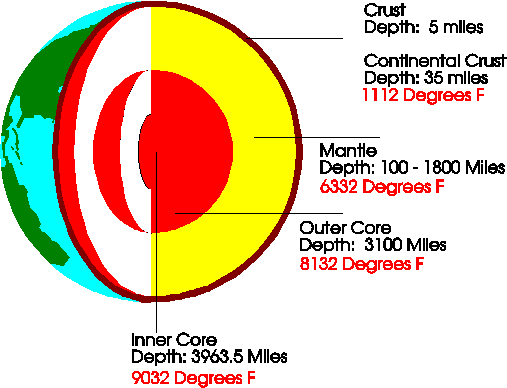

Welcome to Planet Earth.
"The earth is not a mere fragment of dead history, stratum upon stratum like the leaves of a book, to be studied by geologists and antiquaries chiefly, but living poetry like the leaves of a tree, which precede flowers and fruit,—not a fossil earth, but a living earth; compared with whose great central life all animal and vegetable life is merely parasitic." - Henry David Thoreau
A little about our home planet
The earth is the third planet from the sun and the fifth largest. It
orbits our sun at a distance of 149,600,000 km, has a diameter of 12,756.3
km, and a mass of about 5.972e24 kg.
Our planet consists of five layers, shown below:
 (http://www.chariho.k12.ri.us/faculty/riordan/Mountains/layers.gif)
(http://www.chariho.k12.ri.us/faculty/riordan/Mountains/layers.gif)
The earth rotates our sun in a period of 365.26 days and revolves in a period of 23.93 hours, making for a mean orbital velocity of 29.79 kilometers per second. The earth is on an inclination of 23.45 degrees. The position of the earth in relation to our solar system is shown below:
(http://www.chariho.k12.ri.us/faculty/riordan/Mountains/layers.gif)
"The lonely Earth amid the balls
That hurry through the eternal halls,
A makeweight flying to the void,
Supplemental asteroid,
Or compensatory spark,
Shoots across the neutral Dark" - Ralph Waldo EmersonThe earth is also the only known planet inhabited with intelligent life. Although attempts are being made to communicate with any extraterrestrial life outside our planet, by such organizations as SETI (Search for Extraterrestrial Intelligence), no evidence of this has been found. Although as famous astronomer Martin Rees would say, "Absence of evidence is not evidence of absence", life as we know it has been deemed impossible on all other planets in our solar system.
(http://pulsar.princeton.edu/images/telescopes/ARECIBO.jpg) The Arecibo Observatory in Puerto Rico, where planetary and astronomical research is conducted.
Life on other planets has long been the subject of popular science fiction, such as H.G. Wells' War of the Worlds, or more recently such books as Carl Sagan's Contact, but no indication of it has ever been found. So we must ask ourselves, if there is apparently no intelligent life outside of our planet, how can we be here? On the following pages we will examine just a few of the conditions for our existence on earth, starting with a short history of the study of our universe, an overview of a few of the many conditions of life on our planet, and then a few overview pages outlining just a few theories that attempt to explain just how it is that this complexity of life came originally came into being. Please follow the links below: